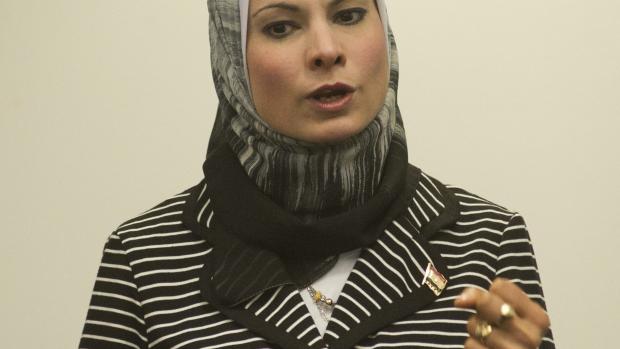Revolutionaries Ahmed Salah and Mahitab al-Gilani Visit NYU-Poly

The farmer’s almanac lists March 20 as the official start of spring, establishing a common point for the one-year anniversary of the “Arab Spring,” the series of uprisings that began in Tunisia in December 2010 before spreading to nearby countries in the months that followed — Sudan in January, Bahrain and Libya in February, Syria in March.
Standing before the audience at Rogers Hall at Polytechnic Institute of New York University (NYU-Poly) a few weeks ago, Ahmed Salah reminded the gathered crowd that the protests continue. Some nations may have successfully pushed their leaders to resign, he said, but the replacements aren’t always an improvement. In Egypt, for example, where the activist resides, protesters were able to force dictator Hosni Mubarak from power, only to have the military take his place. Now the unwanted military rulers are attempting to remain in power.
“Their biggest weapon in the counterrevolution is the media,” said Salah, “so they try more and more to have absolute control over the media.”
Control over communication channels in Egypt is ostensibly what the revolutionary had come to discuss during his return visit to NYU-Poly, where he spoke via Skype last fall at the Technology & Society Lecture Series hosted by the Department of Technology, Culture and Society.
Jonathan Soffer, a professor in the department and an attendee at Salah’s lecture last semester and this spring, had first heard Salah at a speaking event in San Francisco, noting that he “had never met anyone who seemed to have such a clear vision of the possibility of nonviolent revolution and democracy in his country.”
Impressing the crowd equally at NYU-Poly, Salah offered, in person this time, a more detailed account of the historic events that took place a year ago, explaining how “keyboard activists” rallied supporters through social networking sites such as Facebook. But most of the community organizing that preceded the protests involved offline activities, he said, with activists trying to reach ordinary men and women — housewives, for instance, or soccer players.
The government then in power increasingly targeted the activists, with Salah himself shot at with rubber bullets. He told the audience how he witnessed for the first time last year another activist die from gunshot wounds. “The story is of pain, of sadness, of suffering,” he said, “but also of great hope.”
Joining him that night was Mahitab al-Gilani, another organizer especially active in community outreach. Asked by an audience member how she conducted her work, al-Gilani, translated by Salah, explained how she had been “brainwashed” by Mubarak’s administration and so could easily relate to those still supportive of the dictator. Her ability to bond with those who did not share her views garnered their trust and allowed al-Gilani to share her own story and how she “understood finally that politics is inseparable from life” and that “in order to serve society…I have to be active in politics.”
Salah concluded the evening by urging attendees to contact their political representatives and encourage them to support protestors in Egypt, not the military in power there. The last word came from al-Gilani, though. Speaking through Salah, she told the audience, “They tried with us all different tools of oppression [but] this revolution will continue until victory or martyrdom.”




